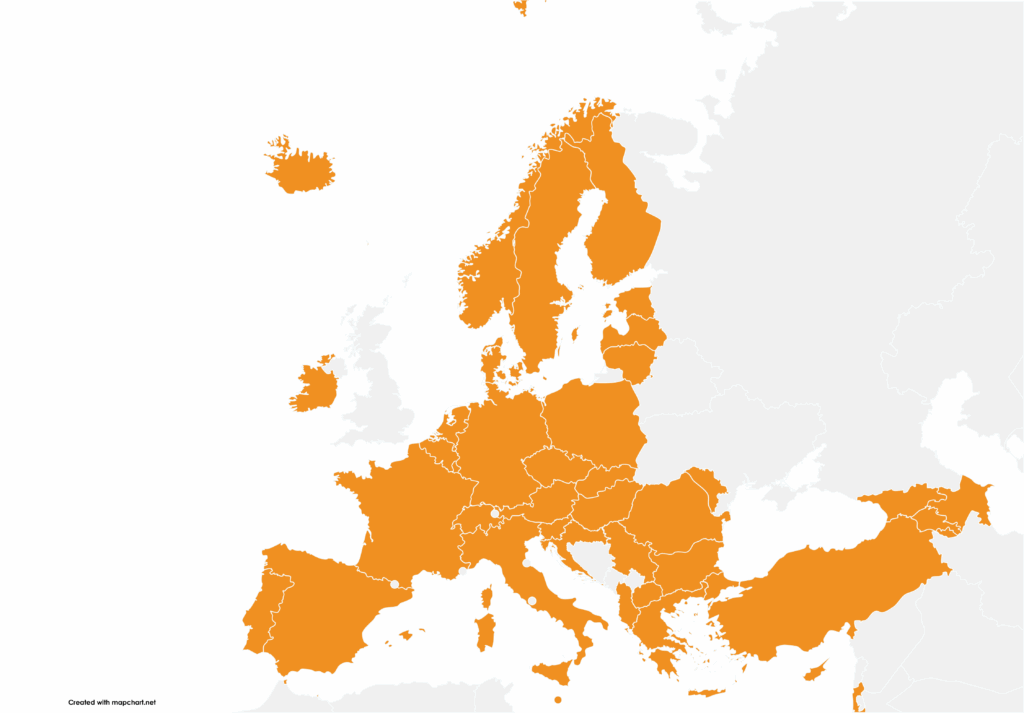Take advantage of InAcademia’s powerful features
Geographic availability

Albania, Armenia, Austria, Azerbaijan, Belgium, Bulgaria, Canada, Croatia, Cyprus, Czechia, Denmark, Estonia, Finland, France, Georgia, Germany, Greece, Greenland, Hungary, Iceland, Ireland, Israel, Italy, Latvia, Lithuania, Luxembourg, Malta, Moldova, Netherlands, North Macedonia, Norway, Poland, Portugal, Romania, Serbia, Slovakia, Slovenia, Spain, Sweden, Switzerland, Turkey, Uganda
Advanced features
| Simple method to present in-scope institutions for users to select: | InAcademia's IdP hinting feature provides an easy-to-implement way to control which institutions and/or markets are eligible for your offers. We provide a repository of JSON feeds that your solution can consume in order to populate prompts or drop down lists of in-scope institutions. It can be used to fill prompts or dropdowns with eligible institutions, allowing merchants to start the login process when a user selects their institution. The feeds are updated frequently, which has the added benefit that if an institution changes the endpoint of its identity provider, or a new institution is introduced, the merchant will inherit the changes in a way that doesn't disrupt the validation process. |
| Supports “one-time only offer” verification: | The re_use detection feature adds a claim to the OIDC request that will elicit a privacy-preserving response from InAcademia that contains a pseudonymised hash of any supported persistent identifiers received from the IdP, presenting a series of values that merchants permitted to use the persistent flow can utilise in order to recognise a returning user, for example, allowing merchants to identify whether a user has already consumed a one-per-user offer. |
| Provides confirmation of affiliated institution: | The IdP Hint Assertion feature, when combined with IdP Hinting, makes it possible for a merchant to be satisfied that the user verified at the same institution that they selected when initiating the authentication process, adding further assurance in use cases that require affiliation to a specified institution. |
Founded on OpenID Connect
Merchants connect to InAcademia using the widely adopted OIDC protocol. InAcademia provides a uniform technical experience for merchants and presents a familiar single-sign-on user interface to users. InAcademia provides a gateway to the heterogeneous, largely SAML-based landscape of R&E Identity Federations and academic Identity Providers in the background, thus removing the need to support older protocols, and hiding all the complexity that is inherent in the varying policies of federation and identity provider solutions.
InAcademia’s enhanced workflow adds a vital layer of intelligence to native OIDC and SAML errors, making it much easier for merchants to determine the most appropriate user outcomes for the result of all validation requests.
More technical information about InAcademia.
Have a Question?
Check out the Frequently Asked Questions section or Contact us
Please note: the InAcademia Service makes no attempt to create a relationship with users/students; its operators are in no way responsible or obligated to the end user for any aspect of the products/services subject to the purchase. InAcademia does not act as an agent for the student, merchant, institution or identity federation, and its academic validation is a non-linear process that does not relate to the sale itself.
